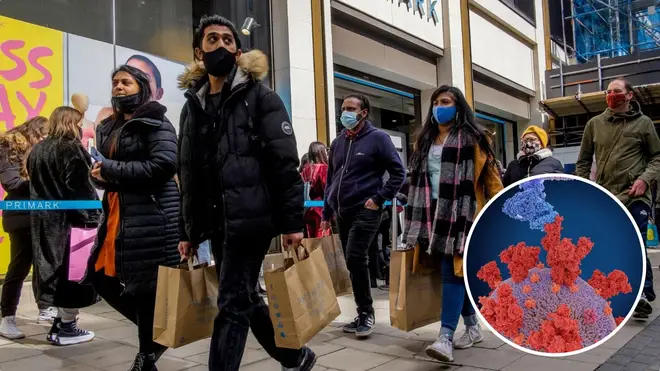
Simon Marks 4pm - 7pm
27 November 2021, 18:17 | Updated: 28 November 2021, 11:21

The new Omicron variant has worried experts since its discovery in southern Africa.
Scientists are racing to learn about its effects and the Government wants to delay its spread until more is known.
Boris Johnson held a press briefing on Saturday afternoon in which he introduced a package of new measures.
Here's why Omicron is worrying experts, and what the Government is doing about it.
Read more: New Omicron measures: PM announces tighter face mask rules and all arrivals must isolate
Read more: Two UK cases of Omicron Covid variant detected with ‘link to travel to southern Africa’
All variants are monitored closely to see if they behave differently than existing Covid variants.
Vaccines remain the best defence against serious illness and death from coronavirus infection, but there are fears Omicron could render them somewhat less effective.
The exact nature of that is not yet clear because the variant is so new, and scientists need more time to study it.
It's designated Omicron by the World Health Organisation, which uses Greek letters to identify different variants.

PM announces Omicron changes to travel rules
Mr Johnson spelled out the primary concern in his Downing Street briefing, saying it "might at least in part reduce the protection of our vaccines over time".
Nonetheless, he continues to urge people to get their jabs and boosters, adding that they do appear to offer at least "some measure" of protection against it – and it is thought fully-vaccinated people will be less likely to get seriously ill.
Government experts will now decide if booster jabs should be rolled out to all adults and if children aged 12-15 should get a second dose.
Two cases have been detected in Britain – one in Nottingham and the other in Essex.
The latter case is linked to the one detected in Nottingham, which is connected to travel to southern Africa, though the person's full travel history has not been revealed.
Omicron was first discovered in southern Africa.

Government plans to reintroduce face masks in shops and on transport
In short, all new arrivals to the UK must self-isolate and take a PCR test by the end of their second day in the country. They'll have to keep isolating until they get a negative test.
Rules around using face masks in shops and on public transport will be tightened up, but we await clarity on what that means.
Anyone who is identified as a contact of an Omicron case must isolate even if they are fully vaccinated.
These measures do not add up to a lockdown – but they do represent a significant tightening up with regards to foreign travel.

'Reasonable chance' of some vaccine-protection escape by Omicron
Given how quickly the Covid picture has changed over the past year-and-a-half, the Government appears wary of promising and failing to deliver.
But Mr Johnson did tell the briefing that he believes Christmas will be "considerably" better than last year.
His chief scientific adviser issued a starker warning, saying the UK could have to "face up" to further action if Omicron proves very transmissible.
This tranche of measures will be reviewed in three weeks' time.